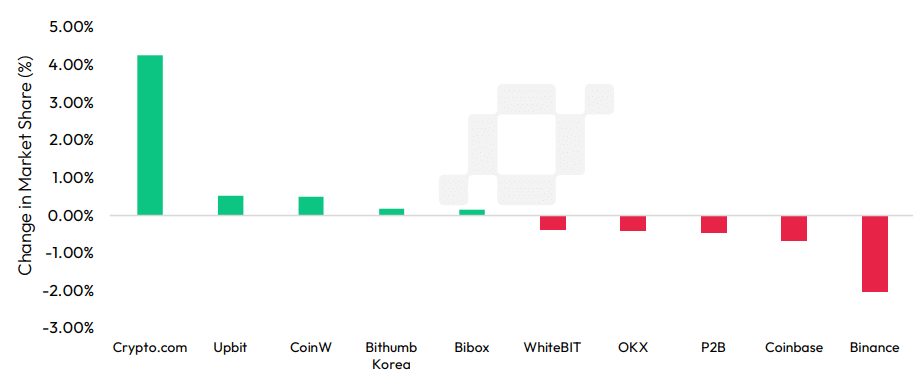The largest cryptocurrency exchange, Binance, experienced a decline in market share during Red September as competing platforms gained a larger trading volume from users.
As detailed in a CCData report released on Oct. 3, Binance’s spot and derivatives trading volumes fell by 23% and 21%, respectively, amid a general decrease in centralized exchange activity last month. According to CCData researchers, trading volumes across centralized exchanges dipped by 17% in September, a historically challenging time for digital assets.
The exchange, established by crypto pioneer Changpeng Zhao, accounted for 27% of the market share in the spot trading sector and held 40% of the derivatives market volume post-decline. This marks a return to the market share levels last seen in 2020.

The platform is now guided by Richard Teng, who succeeded CZ, and has faced numerous regulatory challenges from U.S. authorities following a Securities and Exchange lawsuit in June 2023.
Prosecutors from the SEC have criticized Binance’s listing practices in proposed amended filings, alleging that the exchange operated as an unregistered brokerage and offered trading in illegal securities.
In the meantime, competing exchanges are capitalizing on Binance’s diminishing influence. CCData reported that Crypto.com experienced a remarkable 40% increase in both spot and derivatives markets last month.
Year-to-date, Crypto.com has seen the most significant gains in spot markets, boosting its market share by 8.08% to 10.5%. Both Bybit and Bitget have also made notable strides this year, increasing their market shares by 3.48% and 1.59% to 9.60% and 3.34%, respectively.
In contrast, Binance, Upbit, and OKX have suffered substantial losses in market share, declining by 5.34%, 4.60%, and 4.04% to 27.0%, 2.50%, and 3.91%, respectively.
CCData report
Analysts anticipate an uptick in asset prices and liquidity in Q4, fueled by expected Federal Reserve rate cuts and developments in the U.S. presidential election. Meanwhile, crypto markets have faced downward pressure due to global economic uncertainties linked to conflicts in the Middle East.








